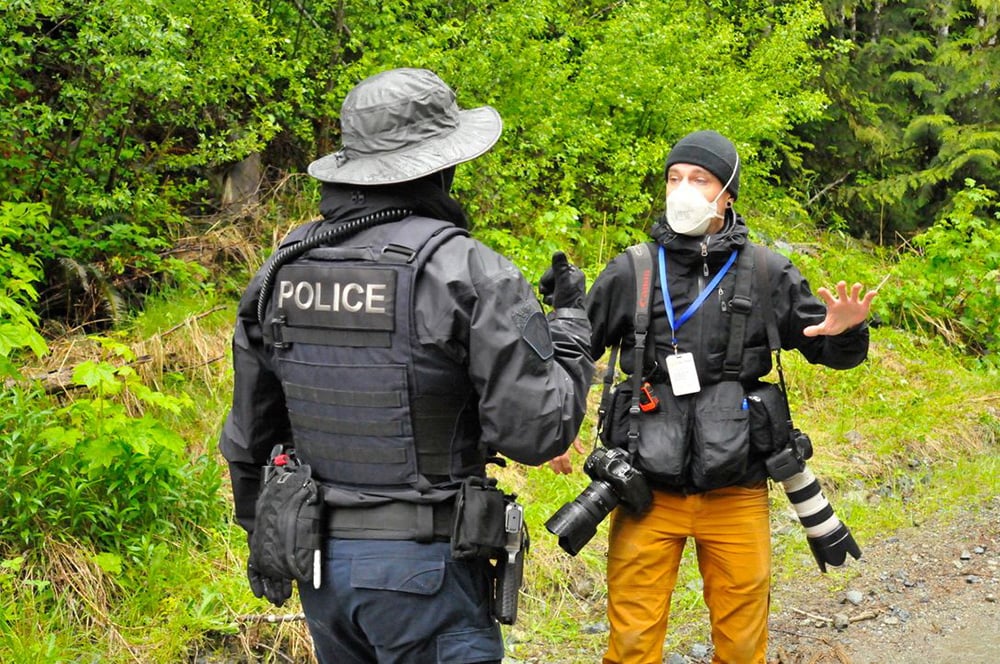It’s time for the RCMP to let journalists do their job. That’s the message behind a legal challenge filed by a group of Canadian media organizations who argue that the RCMP’s enforcement of an injunction at anti-logging demonstrations on Vancouver Island is denying journalists the “substantive access” they need to report.
The challenge was announced following reports that the RCMP threatened to arrest journalists and photographers documenting the protests at Fairy Creek and Caycuse watersheds.
The police barred journalists from entering so-called “exclusion zones.” The restricted areas, established by the RCMP, change frequently and are enforced inconsistently, according to first-hand reports by journalists, who say the effect is to distance them from the action they are there to cover.
“The ability of journalists to access and report on matters of public interest receives strong protection under Canadian law,” members of the coalition, which is led by the Canadian Association of Journalists and includes a number of independent news outlets, wrote in a letter sent to the RCMP days before the challenge was filed.
“Injunctions, such as the one in place at Fairy Creek, are not intended to interfere with those legal rights and interests, and must not be enforced by the RCMP in such a way that unnecessarily prevents or impedes journalists from exercising those rights and performing their vital function,” the letter said, citing case law which states that injunctions should not prevent journalists from covering protests.
The BC Civil Liberties Association, meanwhile, has declared the exclusionary zones “unlawful” in a letter of protest sent to B.C.’s solicitor general and the RCMP deputy commissioner.
Ora Cogan is an independent photographer covering the enforcement of the injunction for Sierra Club BC. On May 24, she and Jesse Winter, a photojournalist on assignment with the Globe and Mail, were stopped by officers on a road near a camp. Officers told them they had entered an exclusion zone, and that they would be arrested if they did not leave.
Cogan called the arrest threat “illegal and ridiculous.” The RCMP tactics, she said, are “limiting not only accredited journalists, but people who work in media at any capacity, and the public. We have a right to freedom of movement.”
Although an RCMP media liaison officer eventually allowed them to return to the zone, it frustrated the photographer. “It seems like their intention was to move forward with the injunction without the accredited members of the press there,” said Cogan, who witnessed the RCMP use similar tactics at the raid on Unist’ot’en in 2020.
The Tyee reached out to Winter, who was unable to respond by press time. He has tweeted here about his encounters with the RCMP while trying to cover the protests.
The RCMP’s policy has been to corral journalists in a designated media area, where an officer told the pair “you can stay and journal all you want.” But those areas are often so far from encounters between police and protesters that journalists can’t get a good look or hear what’s being said.
In some cases, journalists have been told to stay in one designated area while arrests were happening unknown to them down the road and out of sight.
Jerome Turner is a reporter at Ricochet Media, which is part of the coalition filing the legal challenge. He described being “corralled” in a designated media area, which was about 170 feet away from where arrests were being made, so only the journalists with a telephoto lens had a chance of documenting any of the events.
“Once they do have us kennelled, they don’t let us leave without an officer with us,” he said. “And they also don’t have enough officers to do that. So to make that restriction, to make that part of their policy, it really restricts media from being able to do their job.”
More than 100 protesters have been arrested so far, and on Tuesday more than 100 seniors reportedly “overwhelmed” an exclusion zone guarded by a few RCMP officers who abandoned the site.
Turner points out all the protesters have behaved peacefully, posing no danger to journalists. But the RCMP officers are well-armed. “The only danger I can see,” said Turner of the police making arrests, “is on their right hip.” ![]()
Read more: Rights + Justice, Media
















Tyee Commenting Guidelines
Comments that violate guidelines risk being deleted, and violations may result in a temporary or permanent user ban. Maintain the spirit of good conversation to stay in the discussion.
*Please note The Tyee is not a forum for spreading misinformation about COVID-19, denying its existence or minimizing its risk to public health.
Do:
Do not: